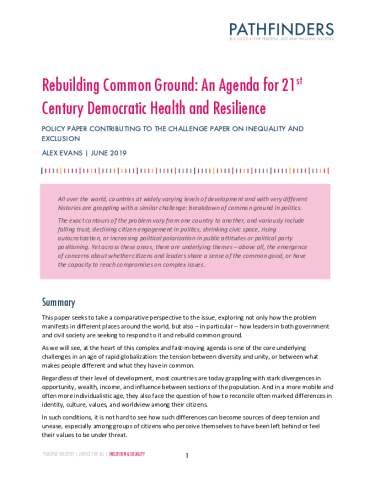Rebuilding Common Ground: An Agenda for 21st Century Democratic Health and Resilience
Contributors: Alex Evans
This policy brief is the second contribution to the challenge paper on the Grand Challenge on Inequality and Exclusion, part of the Pathfinders initiative, which will be launched in July 2019 at the UN High-level Political Forum.
All over the world, countries at widely varying levels of development and with very different histories are grappling with a similar challenge: breakdown of common ground in politics. The exact contours of the problem vary from one country to another, and variously include falling trust, declining citizen engagement in politics, shrinking civic space, rising autocratization, or increasing political polarization in public attitudes or political party positioning. Yet across these areas, there are underlying themes – above all, the emergence of concerns about whether citizens and leaders share a sense of the common good, or have the capacity to reach compromises on complex issues.

This paper seeks to take a comparative perspective to the issue, exploring not only how the problem manifests in different places around the world, but also – in particular – how leaders in both government and civil society are seeking to respond to it and rebuild common ground.
As we will see, at the heart of this complex and fast-moving agenda is one of the core underlying challenges in an age of rapid globalization: the tension between diversity and unity, or between what makes people different and what they have in common.
Regardless of their level of development, most countries are today grappling with stark divergences in opportunity, wealth, income, and influence between sections of the population. And in a more mobile and often more individualistic age, they also face the question of how to reconcile often marked differences in identity, culture, values, and worldview among their citizens.
In such conditions, it is not hard to see how such differences can become sources of deep tension and unease, especially among groups of citizens who perceive themselves to have been left behind or feel their values to be under threat.
Inevitably, the temptation for those who see such differences as threats is to seek to enforce unity – whether through more authoritarian forms of government, tighter controls on freedom of the press, attempting to reclaim sovereignty from supranational levels, or through policies that favor “in-groups” over “out-groups”.
Yet given that such approaches can easily trigger equally powerful counter-reactions from the other end of the political spectrum, there is a real risk that political and social cohesion can unravel as actors pull away from each other and from any sense of shared values, identities, or even interests.
This paper therefore aims to map out ways in which both political and civil society leaders and citizens alike can find their way back to common ground and the ability to make practical compromises on polarizing issues.
Part One of the paper explores a range of the factors that have been suggested as drivers of erosion of common ground, focusing primarily on four main areas:
- Political trends – including mistrust of elites and feelings of alienation from politics, perceptions of corruption, shifts in party affiliation, changes in media consumption, and trends in the digital space including the rise of social media
- Economic trends – including unemployment, wage stagnation, general economic insecurity, and inequality
- Demographic and social trends – including demographic change, immigration, sociological “sorting”, and clashes between different “values tribes”
- Underlying all of the first three areas, psychological and behavioral dynamics – including the perception of economic and security threats, social disconnection, or fears of change, of the future, or of loss outweighing gains
Part Two of the paper then explores ways in which leaders and citizens can find ways back to a shared sense of common ground, common identity, and common purpose – which in practice might involve three areas of endeavor.
- “Untriggering” politics by finding ways to reduce group-based threat perception
- Addressing grievances by finding ways to deal with underlying real world concerns about specific policy areas
- Rebuilding common ground by finding ways to develop a sense of empathy and common identity among citizens
The paper concludes by arguing that addressing these trends matters not only because of the risk that breakdown of common ground poses to democratic health, but also because rebuilding common ground is an essential prerequisite to tackling the defining global challenges of the 21st century and achieving the Sustainable Development Goals (SDGs).
Recommendations
- The paper recommends a multi-country Common Ground Index, gauging both sources of vulnerability (the kinds of issues explored in Part One of this paper) and of resilience (the areas covered in Part Two), drawing on both objective statistical indicators and subjective data from sources such as opinion polls or sample questionnaires to gauge perceptions and fears.
Untriggering politics
- Political leaders should take care to be seen to listen to, acknowledge, and address people’s fears, including through political appointments or dedicated processes.
- Political leaders should use language carefully, avoiding dehumanizing terms, and civil society organizations should highlight instances in which leaders fail to do so.
- Political leaders should invest in values segmentation analysis to help them frame their messaging in ways that works to build rather than erode common ground, in particular to avoid activating contagious forms of threat perception.
- Political leaders should focus on ways of rebuilding trust, especially through political appointments and political apologies, as well as through responding to underlying grievances (see below).
- Political and civil society leaders should invest in mechanisms for building psychological resilience among publics in order to inoculate politics against contagious threat perception and enable citizens to choose how to react to events instead of acting from defensive instinct.
Addressing underlying grievances
- Political leaders should be willing to consider moderating the short term pace of change, for instance in economic opening, when public concerns are spiking.
- Political leaders should pay particular attention to social protection, including both objective coverage standards and subjective perceptions of it (e.g. adequacy of coverage, whether coverage is seen as better or worse than it used to be, conditionalities to qualify for assistance).
- Political leaders should consider major redistribution efforts as a potential remedy for grievances caused by income or wealth inequality and especially perceived relative deprivation, looking in particular at rents from unearned forms of wealth like land.
- Political leaders should develop clear visions for how to restore the relationship between citizens and states, in the first instance through taking a visibly zero tolerance approach to corruption.
- Political and civil society leaders should work together to improve transparency and citizen participation, and engagement, for instance through citizens’ assemblies or through systematic consultation on major policies or reforms.
- Political and civil society leaders should look at ways of reforming multilateral institutions to make them more democratic and less open to the charge of being platforms for policy agendas perceived as benefiting elites more than publics.
Rebuilding common ground
- Political and civil society leaders should work together to develop shared national narratives, whether through political leadership, national dialogues, truth and reconciliation commissions, or other means.
- Political leaders should recognize that constitutional reforms are key moments at which citizens’ confidence can be won or lost, and work to maximize participation at these moments even if this means processes take longer than they otherwise would.
- Political and civil society leaders should work together to look at reforms of political parties to make them less susceptible to capture, and in particular consider state funding of parties to reduce dependence on private donations or “dark money”.
- Civil society leaders should look at ways of creating processes to build social contact, empathy, and common ground between “values tribes”.
Related Resources
